专题11 句型转换80题(专项训练)-2024-2025学年六年级英语下册期中复习专项下册牛津译林版(含答案解析)
文档属性
| 名称 | 专题11 句型转换80题(专项训练)-2024-2025学年六年级英语下册期中复习专项下册牛津译林版(含答案解析) | 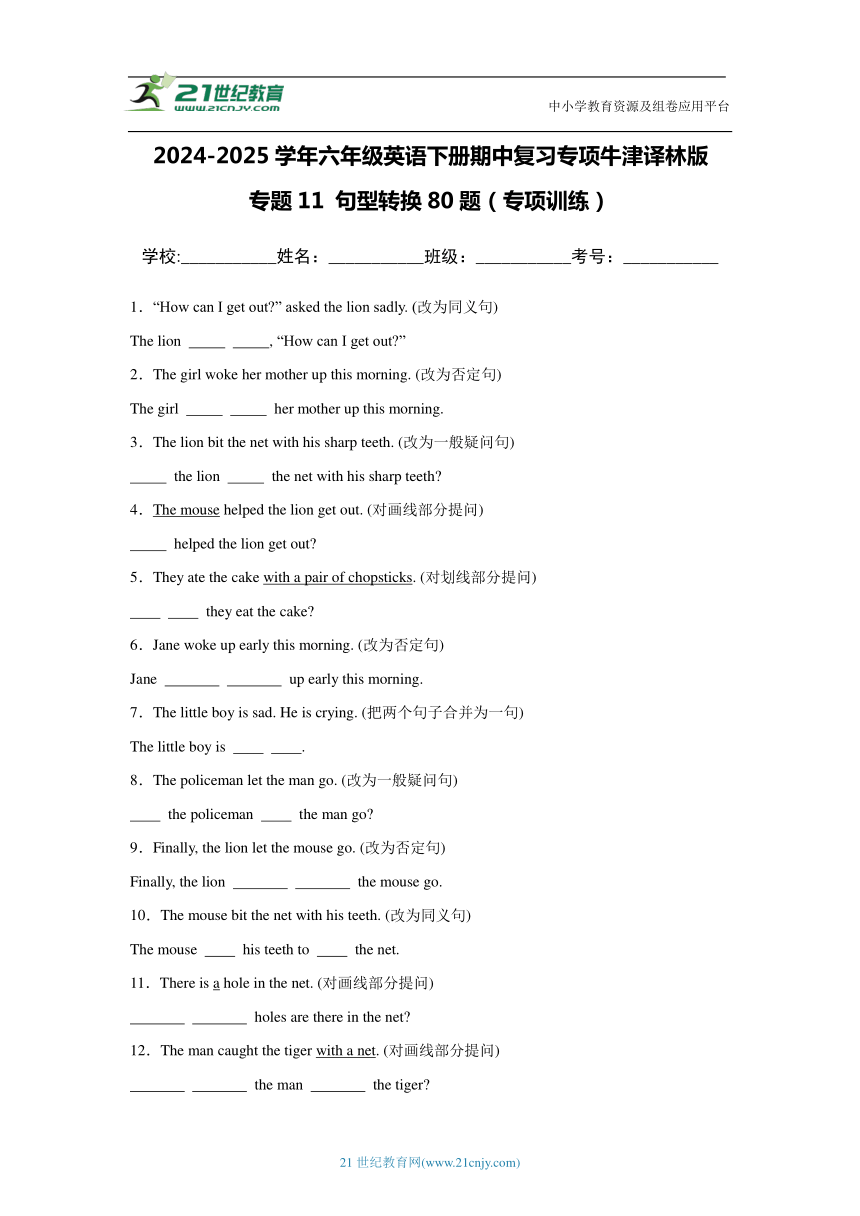 | |
| 格式 | docx | ||
| 文件大小 | 149.3KB | ||
| 资源类型 | 试卷 | ||
| 版本资源 | 牛津译林版 | ||
| 科目 | 英语 | ||
| 更新时间 | 2025-04-08 11:19:05 | ||
图片预览

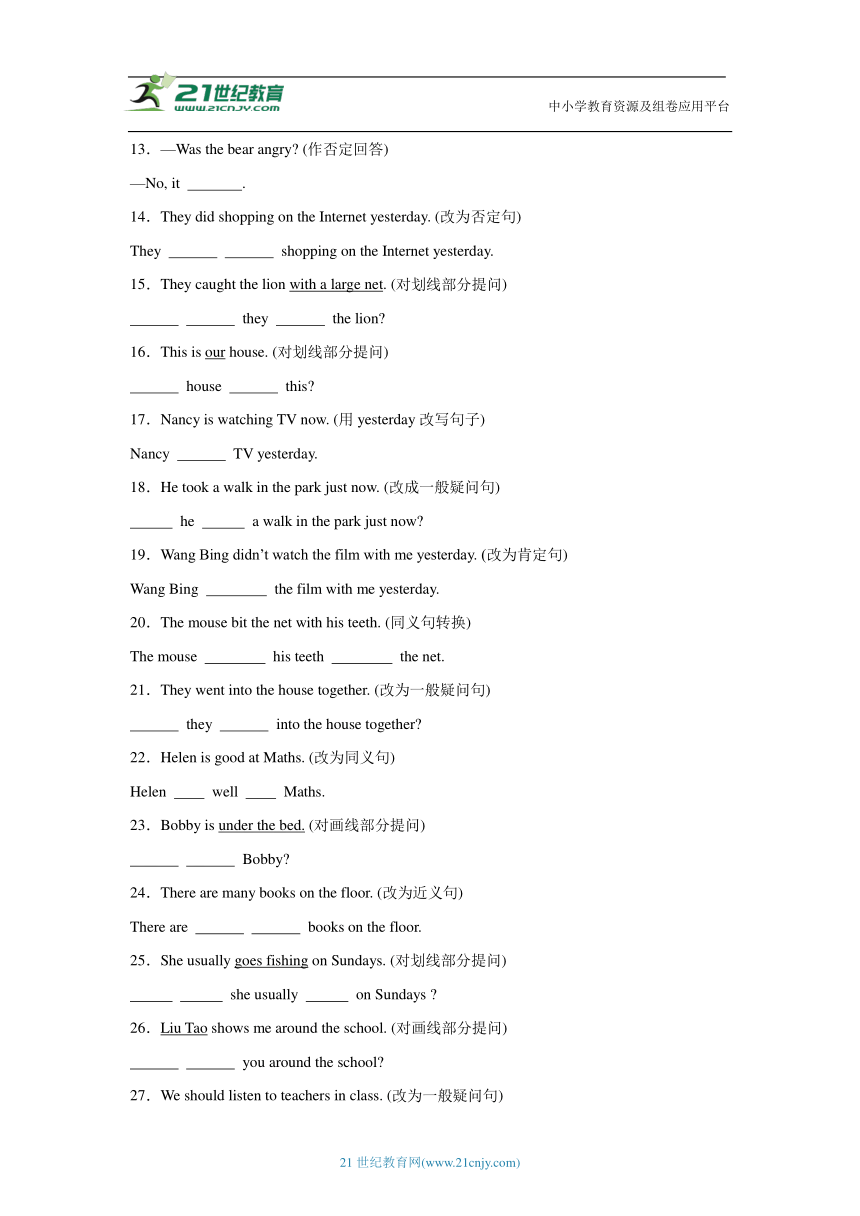
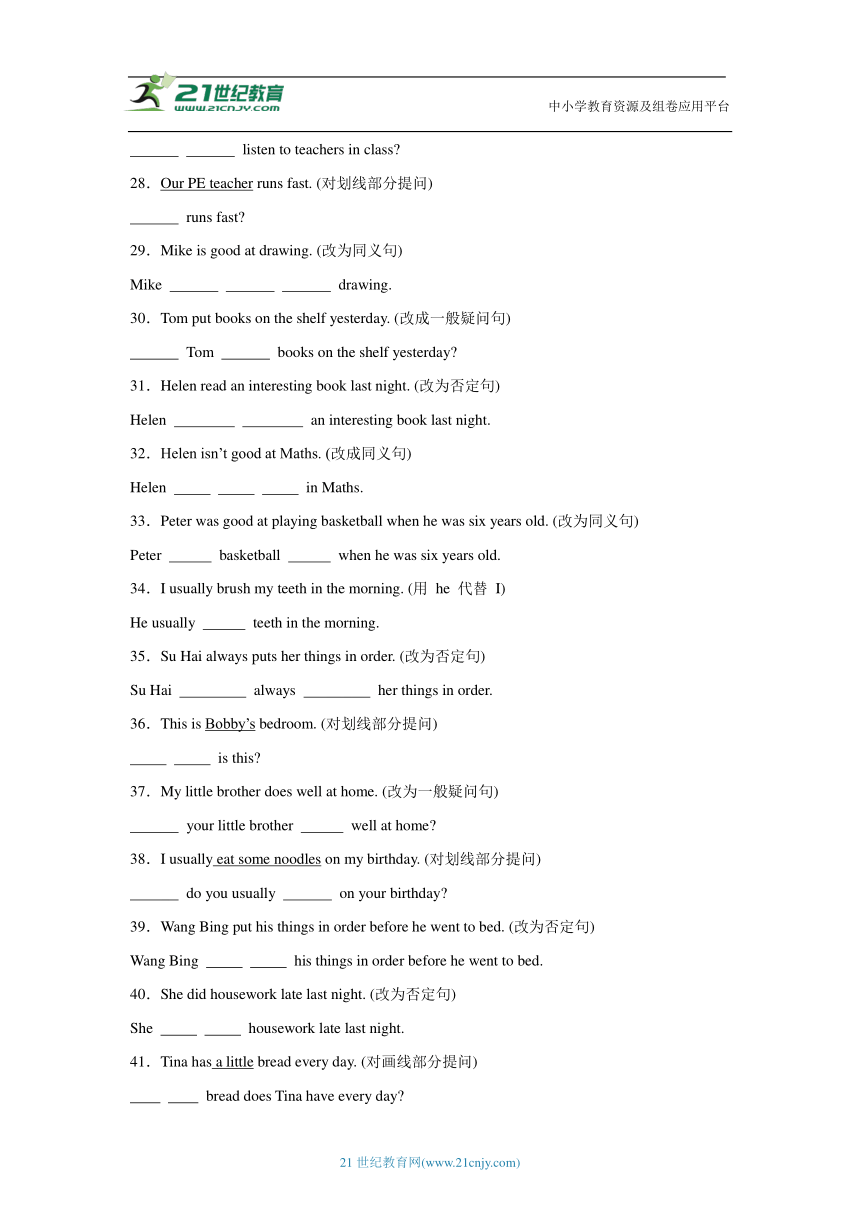
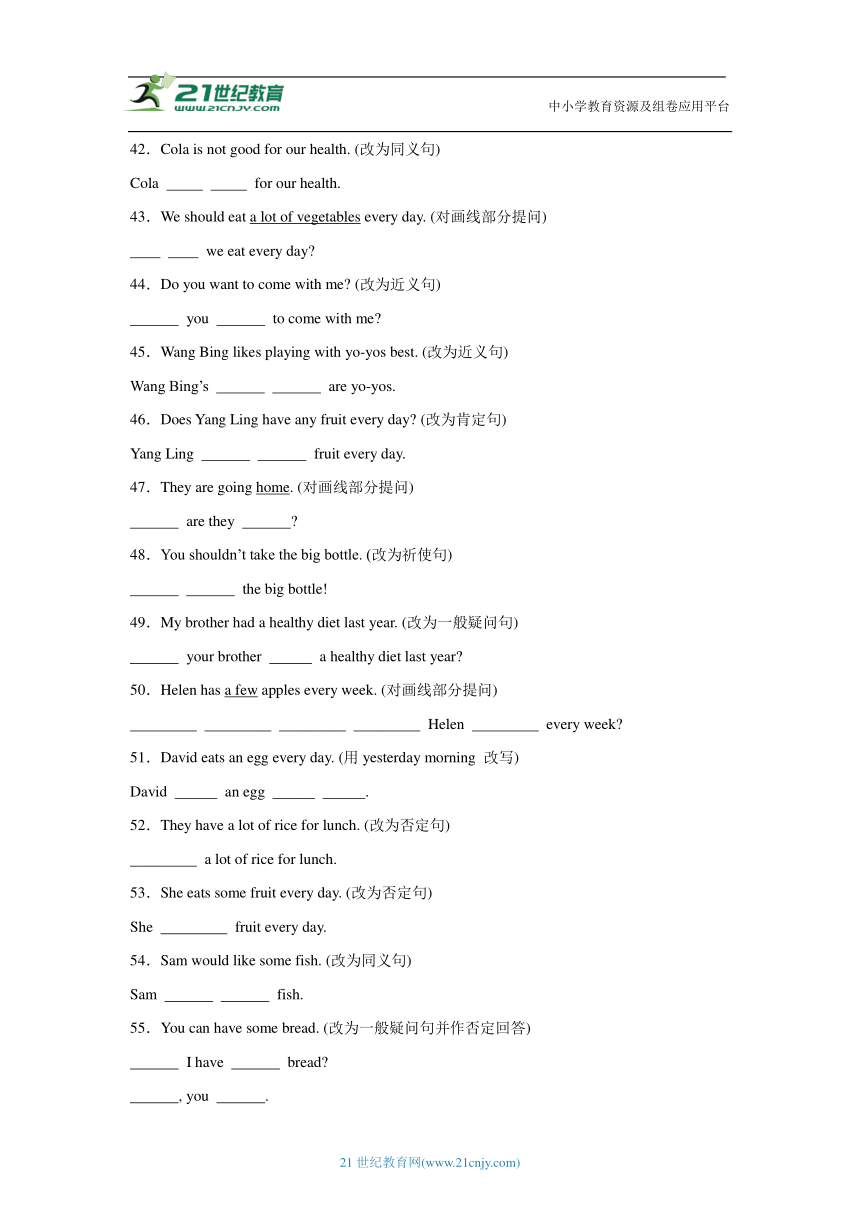
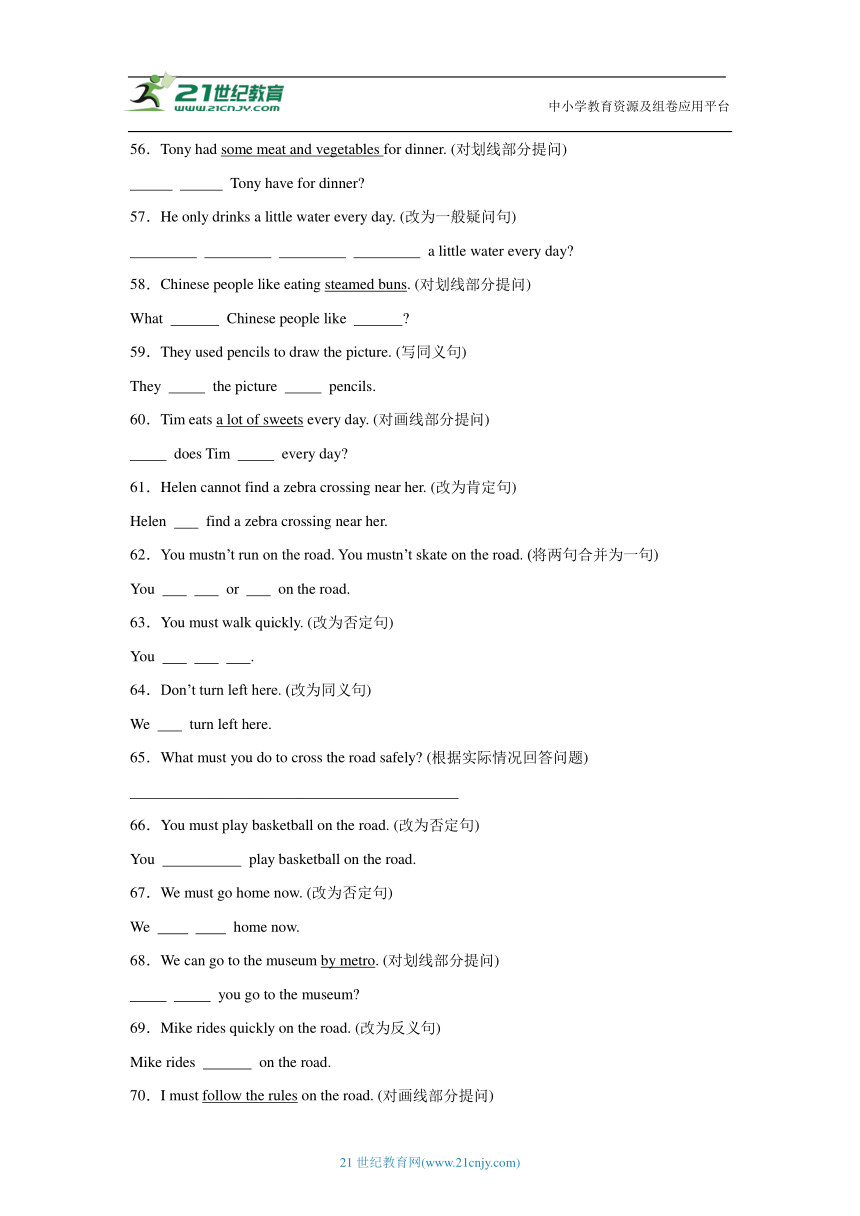
文档简介
中小学教育资源及组卷应用平台
中小学教育资源及组卷应用平台
2024-2025学年六年级英语下册期中复习专项牛津译林版
专题11 句型转换80题(专项训练)
学校:___________姓名:___________班级:___________考号:___________
1.“How can I get out ” asked the lion sadly. (改为同义句)
The lion , “How can I get out ”
2.The girl woke her mother up this morning. (改为否定句)
The girl her mother up this morning.
3.The lion bit the net with his sharp teeth. (改为一般疑问句)
the lion the net with his sharp teeth
4.The mouse helped the lion get out. (对画线部分提问)
helped the lion get out
5.They ate the cake with a pair of chopsticks. (对划线部分提问)
they eat the cake
6.Jane woke up early this morning. (改为否定句)
Jane up early this morning.
7.The little boy is sad. He is crying. (把两个句子合并为一句)
The little boy is .
8.The policeman let the man go. (改为一般疑问句)
the policeman the man go
9.Finally, the lion let the mouse go. (改为否定句)
Finally, the lion the mouse go.
10.The mouse bit the net with his teeth. (改为同义句)
The mouse his teeth to the net.
11.There is a hole in the net. (对画线部分提问)
holes are there in the net
12.The man caught the tiger with a net. (对画线部分提问)
the man the tiger
13.—Was the bear angry (作否定回答)
—No, it .
14.They did shopping on the Internet yesterday. (改为否定句)
They shopping on the Internet yesterday.
15.They caught the lion with a large net. (对划线部分提问)
they the lion
16.This is our house. (对划线部分提问)
house this
17.Nancy is watching TV now. (用yesterday改写句子)
Nancy TV yesterday.
18.He took a walk in the park just now. (改成一般疑问句)
he a walk in the park just now
19.Wang Bing didn’t watch the film with me yesterday. (改为肯定句)
Wang Bing the film with me yesterday.
20.The mouse bit the net with his teeth. (同义句转换)
The mouse his teeth the net.
21.They went into the house together. (改为一般疑问句)
they into the house together
22.Helen is good at Maths. (改为同义句)
Helen well Maths.
23.Bobby is under the bed. (对画线部分提问)
Bobby
24.There are many books on the floor. (改为近义句)
There are books on the floor.
25.She usually goes fishing on Sundays. (对划线部分提问)
she usually on Sundays
26.Liu Tao shows me around the school. (对画线部分提问)
you around the school
27.We should listen to teachers in class. (改为一般疑问句)
listen to teachers in class
28.Our PE teacher runs fast. (对划线部分提问)
runs fast
29.Mike is good at drawing. (改为同义句)
Mike drawing.
30.Tom put books on the shelf yesterday. (改成一般疑问句)
Tom books on the shelf yesterday
31.Helen read an interesting book last night. (改为否定句)
Helen an interesting book last night.
32.Helen isn’t good at Maths. (改成同义句)
Helen in Maths.
33.Peter was good at playing basketball when he was six years old. (改为同义句)
Peter basketball when he was six years old.
34.I usually brush my teeth in the morning. (用 he 代替 I)
He usually teeth in the morning.
35.Su Hai always puts her things in order. (改为否定句)
Su Hai always her things in order.
36.This is Bobby’s bedroom. (对划线部分提问)
is this
37.My little brother does well at home. (改为一般疑问句)
your little brother well at home
38.I usually eat some noodles on my birthday. (对划线部分提问)
do you usually on your birthday
39.Wang Bing put his things in order before he went to bed. (改为否定句)
Wang Bing his things in order before he went to bed.
40.She did housework late last night. (改为否定句)
She housework late last night.
41.Tina has a little bread every day. (对画线部分提问)
bread does Tina have every day
42.Cola is not good for our health. (改为同义句)
Cola for our health.
43.We should eat a lot of vegetables every day. (对画线部分提问)
we eat every day
44.Do you want to come with me (改为近义句)
you to come with me
45.Wang Bing likes playing with yo-yos best. (改为近义句)
Wang Bing’s are yo-yos.
46.Does Yang Ling have any fruit every day (改为肯定句)
Yang Ling fruit every day.
47.They are going home. (对画线部分提问)
are they
48.You shouldn’t take the big bottle. (改为祈使句)
the big bottle!
49.My brother had a healthy diet last year. (改为一般疑问句)
your brother a healthy diet last year
50.Helen has a few apples every week. (对画线部分提问)
Helen every week
51.David eats an egg every day. (用yesterday morning 改写)
David an egg .
52.They have a lot of rice for lunch. (改为否定句)
a lot of rice for lunch.
53.She eats some fruit every day. (改为否定句)
She fruit every day.
54.Sam would like some fish. (改为同义句)
Sam fish.
55.You can have some bread. (改为一般疑问句并作否定回答)
I have bread
, you .
56.Tony had some meat and vegetables for dinner. (对划线部分提问)
Tony have for dinner
57.He only drinks a little water every day. (改为一般疑问句)
a little water every day
58.Chinese people like eating steamed buns. (对划线部分提问)
What Chinese people like
59.They used pencils to draw the picture. (写同义句)
They the picture pencils.
60.Tim eats a lot of sweets every day. (对画线部分提问)
does Tim every day
61.Helen cannot find a zebra crossing near her. (改为肯定句)
Helen find a zebra crossing near her.
62.You mustn’t run on the road. You mustn’t skate on the road. (将两句合并为一句)
You or on the road.
63.You must walk quickly. (改为否定句)
You .
64.Don’t turn left here. (改为同义句)
We turn left here.
65.What must you do to cross the road safely (根据实际情况回答问题)
66.You must play basketball on the road. (改为否定句)
You play basketball on the road.
67.We must go home now. (改为否定句)
We home now.
68.We can go to the museum by metro. (对划线部分提问)
you go to the museum
69.Mike rides quickly on the road. (改为反义句)
Mike rides on the road.
70.I must follow the rules on the road. (对画线部分提问)
must you on the road
71.Tina takes a bus to her aunt’s house. (改为近义句)
Tina goes to her aunt’s house .
72.The green light means we can cross the road. (对画线部分提问)
the green light
73.There are some zebra crossings here. (改为否定句)
There zebra crossings here.
74.You mustn’t run on the road. (对划线部分进行提问)
you do on the road
75.Please follow this rule. (改为否定句)
Please this rule.
76.The children must play football on the road. (改为否定句)
77.We mustn’t run on the road. (对划线部分提问)
you do on the road
78.There aren’t any traffic lights here. (改为同义句)
There traffic lights here.
79.We mustn’t run or play on the road. (对划线部分提问)
What you do on the road
80.My brother went to the park by bike. (改为同义句)
My brother a bike the park.
中小学教育资源及组卷应用平台
中小学教育资源及组卷应用平台
21世纪教育网(www.21cnjy.com)
21世纪教育网(www.21cnjy.com)
参考答案及试题解析
1.asked sadly
【解析】句意:“我怎样才能出去?”狮子悲伤地问。本题考查句型转换。原句是直接引语,改为同义句时,需调整为主语在前,动词和副词紧随其后,时态保持不变,故第一空填动词asked;第二空填副词sadly。故答案为asked;sadly。
2.didn’t wake
【解析】句意:这个女孩今天早上叫醒了她妈妈。本题考查句型转换。句子是一般过去时,改为否定句需要在动词前面加didn’t,动词woke改为原形wake。故答案为didn’t;wake。
3.Did bite
【解析】原句句意:狮子用他锋利的牙齿咬烂网。本题考查句型转换。该题要求改为一般疑问句。该句有动词bit,时态为一般过去时。变一般疑问句要借助助动词did,后跟动词原形,bit要用原形bite,故答案为Did,bite。
4.Who
【解析】句意:老鼠帮助狮子逃出来。本题考查句型转换。画线部分是主语,提问时需要针对“谁”进行提问,使用疑问词 Who。故答案为Who。
5.How did
【解析】原句句意:他们用筷子吃蛋糕。本题考查句型转换。划线部分是吃蛋糕的方式,用how提问,句子是一般过去时,助动词用did,故答案为How,did。
6.didn’t wake
【解析】原句句意:简今天早上醒得很早。本题考查句型转换。句子是陈述句,时态是一般过去时。句中有实义动词,改为否定句需借助助动词didn’t,将woke改为动词原形wake,故答案为didn’t;wake。
7.crying sadly
【解析】原句句意:小男孩很伤心。他在哭。本题考查句型转换。题干要求把两个句子合并为一句,句意为:小男孩正在伤心的哭。修饰动词用副词sadly伤心地,故答案为crying,sadly。
8.Did let
【解析】原句句意:警察让这个男人走了。本题考查句型转换。根据let可知句子时态为一般过去时,改为一般疑问句,句首加助动词did,实义动词变原形,let原形与过去式同形,故答案为Did,let。
9.didn’t let
【解析】句意:最后,狮子让老鼠走了。本题考查句型转换。原句谓语动词let是过去式,改为否定句,助动词用didn’t,let用原形,let原形和过去式一样。否定句句意:最后,狮子没有让老鼠走。故答案为didn’t,let。
10.used bite
【解析】原句句意:老鼠用牙齿咬网。本题考查同义句转换。bit the net with his teeth可替换为used his teeth to bite the net,故答案为used,bite。
11.How many
【解析】原句句意:网上有一个洞。本题考查句型转换。画线部分是数量,hole洞是可数名词,询问可数名词的数量用how many。故答案为How;many。
12.How did catch
【解析】原句句意:这个人用网抓住了老虎。本题考查句型转换。画线部分是方式方法,用how提问,句子是一般过去时,句子有动词caught,故特殊疑问句需要借助助动词did,放在疑问词之后,后面的动词caught改为原形catch。故答案为How;did;catch。
13.wasn’t
【解析】句意:—小熊生气了吗?—不,它没有。本题考查一般疑问句的答句,该句是Was引导的一般疑问句,作否定回答,was的否定形式是wasn’t,故答案为wasn’t。
14.didn’t do
【解析】原句句意:他们昨天在网上购物了。本题考查句型转换。原句谓语动词did是过去式,改为否定句,助动词用didn’t,did变原形do,故答案为didn’t,do。
15.How did catch
【解析】原句句意:他们用一张大网抓住了狮子。本题考查句型转换。划线部分是抓鱼的方式,用how提问,句子是一般过去时,助动词用did,caught变原形catch,故答案为How,did,catch。
16.Whose is
【解析】原句句意:这是我们的房子。本题考查句型转换。划线部分表示某人的,用whose提问,故答案为Whose,is。
17.watched
【解析】原句句意:南希现在正在看电视。本题考查句型转换。句子是陈述句,时态是现在进行时。题干要求用yesterday改写句子,所以时态变为一般过去时,动词watch用过去式watched,故答案为watched。
18.Did take
【解析】原句句意:他刚才在公园里散步了。本题考查句型转换。原句谓语动词took是过去式,改为一般疑问句,助动词用did,took用原形take,故答案为Did,take。
19.watched
【解析】原句句意:王兵昨天没有和我一起看电影。本题考查句型转换。题干要求改为肯定句,去掉助动词didn’t,watch用过去式watched,故答案为watched。
20.used to bite
【解析】句意:老鼠用他的牙齿咬网。本题考查句型转换。bit the net with his teeth用牙齿咬网,可以和used his teeth to bite the net互换,use...to do sth.用……来做……,时态是一般过去时,use用过去式used,故答案为used;to bite。
21.Did go
【解析】原句句意:他们一起进了屋子。本题考查句型转换。原句谓语动词went是过去式,改为一般疑问句,助动词用did,went变原形go,故答案为Did,go。
22.does in
【解析】句意:海伦擅长数学。本题考查句型转换。be good at = does well in擅长,故答案为does;in。
23.Where is
【解析】原句句意:鲍比在床下面。本题考查句型转换。画线部分是地点,用where提问,后跟is引导的一般疑问句,故答案为Where,is。
24.lots of
【解析】原句句意:地板上有很多书。本题考查同义句转换。many可用lots of替换,故答案为lots,of。
25.What does do
【解析】原句句意:她通常在星期天去钓鱼。本题考查句型转换。划线部分是做的事情,用what提问,句子是一般现在时,主语she是第三人称单数,助动词用does,后面用动词原形do做,故答案为What,does,do。
26.Who shows
【解析】原句句意:刘涛带我参观了学校。本题考查句型转换。画线部分是人,用who提问,故答案为Who,shows。
27.Should you
【解析】句意:上课我们应该听老师讲课。本题考查句型转换,根据句意可知该句是陈述句,变为一般疑问句,情态动词should提前,we变为you,故答案为Should;you。
28.Who
【解析】原句句意:我们的体育老师跑得快。本题考查句型转换。句子是陈述句,时态是一般现在时。划线部分是具体人物,对其提问用who,句意为:谁跑得快?故答案为Who。
29.does well in
【解析】句意:迈克擅长画画。本题考查句型转换。题目要求改为同义句。be good ar擅长,可以和do well in互换,时态是一般现在时态,主语是Mike,do用第三人称单数does,故答案为does ;well ;in。
30.Did put
【解析】句意:汤姆昨天把书放到了书架上。本题考查句型转换,根据句意可知该句是陈述句,时态为一般过去时,句中有实义动词put,变为一般疑问句,借助助动词did,put用原形,故答案为Did;put。
31.didn’t read
【解析】原句句意:海伦昨晚读了一本有趣的书。本题考查句型转换,原句时态为一般过去时,改为否定句,要用助动词didn’t,其后是动词原形read,故答案为didn’t;read。
32.doesn’t do well
【解析】原句句意:海伦不擅长数学。本题考查同义句转换,be good at=do well in,Helen是第三人称单数,所以助动词用doesn’t,故答案为doesn’t;do;well。
33.played well
【解析】句意:当他六岁的时候,彼得擅长打篮球。本题考查句型转换。be good at basketball = play basketball well篮球打得好,故答案为played;well。
34.brushes his
【解析】原句句意:我通常早上刷牙。本题考查句型转换。根据句中的usually,可知句子为一般现在时,题干要求用he代替I,he为第三人称单数,谓语动词brush也要用第三人称单数形式brushes,my我的变成his他的,故答案为 brushes his。
35.doesn’t put
【解析】原句句意:苏海总是把自己的东西收拾得井井有条。本题考查句型转换。句子是陈述句,时态是一般现在时。主语是第三人称单数,句中有实义动词,改为否定句需借助助动词does,后跟not表示否定,可以缩写成doesn’t,后跟动词原形put。故答案为doesn’t;put。
36.Whose bedroom
【解析】原句句意:这是波比的卧室。本题考查句型转换。由划线部分可知要提问是谁的卧室,用whose提问,句意是:这是谁的卧室?谁的whose,卧室bedroom。由is可知填bedroom的单数形式,故答案为Whose;bedroom。
37.Does do
【解析】原句句意:我的弟弟在家里表现很好。本题考查句型转换,句子是陈述句,时态是一般现在时,句中有实义动词,主语是My little brother,改为一般疑问句需借助助动词does,首字母需大写Does;后跟动词原形do,故答案为Does;do。
38.What do
【解析】原句句意:我通常在我的生日吃一些面条。本题考查句型转换。划线部分是做的事情,用what提问;做do,此处用动词原形。故答案为What;do。
39.didn’t put
【解析】原句句意:以前,王兵睡觉前会把他的东西有次序地放好。本题考查句型转换。根据句意可知该句为陈述句肯定形式。变成否定句后的句意为:以前,王兵睡觉前不会把他的东西有次序地放好。由went可知时态为一般过去时,所以助动词要用did的否定形式didn’t,后跟动词原形put。故答案为didn’t,put。
40.didn’t do
【解析】句意:她昨晚做家务很晚。本题考查句型转换,根据句意可知该句是陈述句,时态为一般过去时,did是实义动词,变为否定句,借助助动词didn’t,did恢复原形do,故答案为didn’t;do。
41.How much
【解析】句意:蒂娜每天吃一点面包。本题考查句型转换。画线部分是数量,bread是不可数名词,询问不可数名词的数量用how much,故答案为How,much。
42.is bad
【解析】原句句意:可乐对我们的健康不好。本题考查同义句转换。对……不好be not good for/be bad for,故答案为is,bad。
43.What should
【解析】原句句意:我们应该每天吃很多蔬菜。本题考查句型转换。画线部分是每天应该吃的,用what提问,后跟should引导的一般疑问句,故答案为What,should。
44.Would like
【解析】原句句意:你想和我一起来吗?本题考查句型转换。want to do sth可替换为would like to do sth,故答案为Would,like。
45.favourite toys
【解析】原句句意:王兵最喜欢玩溜溜球。本题考查句型转换。题干要求改为近义句,根据句意可知横线处可填favourite toys最喜欢的玩具,故答案为favourite,toys。
46.has some
【解析】原句句意:杨玲每天吃水果吗?本题考查句型转换。题干要求改为肯定句,主语Yang Ling后跟动词的第三人称单数has吃,any改为some,故答案为has,some。
47.Where going
【解析】原句句意:他们要回家。本题考查句型转换。画线部分是地点,用where提问,问句为:他们要去哪里?故答案为Where,going。
48.Don’t take
【解析】原句句意:你不应该拿大瓶子。本题考查句型转换。题干要求改为祈使句,don’t+动词原形+其他,故答案为Don’t,take。
49.Did have
【解析】原句句意:我弟弟去年饮食很健康。本题考查句型转换。原句是一般过去式,改为一般疑问句,助动词用did,had变原形have,故答案为Did,have。
50.How many apples does have
【解析】原句句意:海伦每周吃几个苹果。本题考查句型转换。画线部分是数量,apples是可数名词复数,用how many提问,主语Helen是第三人称单数,助动词用does,has变原形have,故答案为How,many,apples,does,have。
51.ate yesterday morning
【解析】句意:大卫每天吃一个鸡蛋。本题考查句型转换。用yesterday morning改写,句子改为了一般过去时,动词用过去式,eats改为过去式ate,后面加上时间yesterday morning。故答案为ate;yesterday;morning。
52.They don’t have
【解析】原句句意:他们午饭吃很多米饭。本题考查句型转换。原句主语they是第三人称复数,时态是一般现在时,改为否定句,助动词用don’t,故答案为They don’t have。
53.doesn’t eat any
【解析】原句句意:她每天吃一些水果。本题考查句型转换。原句谓语动词eats是第三人称单数,改为否定句,助动词用doesn’t,eats变原形eat,some变any,故答案为doesn’t eat any。
54.wants some
【解析】句意:萨姆想要一些鱼。本题考查句型转换,题干要求改为同义句,would like想要,同义词是want,主语是He,故谓语动词需用动词的第三人称单数wants,some一些,故答案为wants;some。
55.Can some No can’t
【解析】原句句意:你可以吃一些面包。本题考查句型转换。句子是陈述句。改为一般疑问句需将情态动词提前,将you改为I,在表示请求或希望得到对方肯定回答的疑问句中用some表示“一些”,否定回答用no,can提问用can回答,后加not表示否定,可以缩写成can’t,故答案为Can,some,No,can’t。
56.What did
【解析】原句句意:托尼晚餐吃了一些肉和蔬菜。本题考查句型转换,划线部分是吃的东西,用what提问,放句首首字母大写What,根据had可知该句是一般过去时,助动词用did,故答案为What;did。
57.Does he only drink
【解析】原句句意:他每天只喝一点水。本题考查句型转换。原句谓语动词drinks是第三人称单数,改为一般疑问句,助动词用does,drinks变原形drink,故答案为Does,he,only,drink。
58.do eating
【解析】句意:中国人喜欢吃馒头。本题考查句型转换。句子是一般现在时,动词是like,句子主语Chinese people是复数,特殊疑问句需要借助助动词用do,like后接动名词,故eating不变。故答案为do;eating。
59.drew with
【解析】句意:他们用铅笔画画。本题考查句型转换,根据句意可知该句是陈述句,时态为一般过去时,改为同义句,可以用介词with代替,draw用过去式drew,故答案为drew;with。
60.What eat
【解析】原句句意:蒂姆每天吃很多水果。本题考查句型转换。画线部分是吃的东西,用what提问,助动词does后跟动词原形,eats的原形是eat,故答案为What,eat。
61.can
【解析】原句句意:海伦在她附近找不到斑马线。本题考查句型转换。含有情态动词can的否定句改为肯定句,把not去掉,其他不变,故答案为can。
62.mustn’t run skate
【解析】原句句意:你不许在路上跑。你不许在路上滑冰。本题考查句型转换。题干要求将两句合并为一句,句意为:你不许在路上跑和滑冰。不许mustn’t,跑run,skate滑冰,故答案为mustn’t;run;skate。
63.mustn’t walk quickly
【解析】原句句意:你必须快点走。本题考查句型转换。含有情态动词must的肯定句改为否定句,在must后加not,must not可以缩写为mustn’t,其他不变,故答案为mustn’t;walk;quickly。
64.mustn’t/can’t/shouldn’t
【解析】句意:在这禁止左转。本题考查陈述句否定形式和情态动词,mustn’t禁止,can’t不能,shouldn’t不应该,故答案为mustn’t / can’t / shouldn’t。
65.I must look for a zebra crossing.
【解析】原句句意:为了安全地过马路,你必须做什么?本题考查特殊疑问句的答语,答案不唯一,可以是:我必须寻找斑马线。我I,必须must,寻找look for,斑马线a zebra crossing,must后用动词原形,look是动词原形,故答案为I must look for a zebra crossing.
66.mustn’t
【解析】原句句意:你必须在马路上打篮球。本题考查句型转换。根据句意可知变成否定句的句意是:你禁止在马路上打篮球。禁止mustn’t,故答案为mustn’t。
67.mustn’t go
【解析】原句句意:我们现在必须回家。本题考查句型转换。含有must的肯定句改为否定句,在must后加not,must not的缩写是mustn’t,故答案为mustn’t,go。
68.How can
【解析】原句句意:我们可以坐地铁去博物馆。本题考查句型转换。划线部分是交通方式,用how提问,后跟can引导的一般疑问句,故答案为How,can。
69.slowly
【解析】原句句意:迈克在路上骑得很快。本题考查句型转换。题干要求改为反义句,quickly快地,反义词是slowly缓慢地,故答案为slowly。
70.What do
【解析】原句句意:我必须遵守路上的规则。本题考查句型转换。画线部分是必须做的事情,用what提问,问句为:你在路上必须做什么?做do,must后跟动词原形,故答案为What,do。
71.by bus
【解析】原句句意:蒂娜坐公共汽车去她姑妈家。本题考查句型转换。题干要求改为近义句,take a bus坐公共汽车,by bus坐公共汽车,故答案为by,bus。
72.What does mean
【解析】原句句意:绿灯意味着我们可以过马路了。本题考查句型转换。画线部分是意味的事情,用what提问,问句为:绿灯意味着什么?主语the green light是单数,助动词用does,后面的动词用原形,故答案为What,does,mean。
73.aren’t any
【解析】原句句意:这里有一些斑马线。本题考查句型转换。there are的肯定句改为否定句,在are后加not,some变any,are not的缩写是aren’t,故答案为aren’t,any。
74.What must not
【解析】原句句意:你不能在路上跑。本题考查句型转换。划线部分是具体事情,应问你不能在路上做什么?疑问词是what,把情态动词must提前变成一般疑问句,放在疑问词后面,原句是否定句,not放在动词do前。故答案为What must,not。
75.don’t follow
【解析】原句句意:请遵守这条规则。本题考查句型转换。该句是please开头的祈使句,改为否定句,句子结构为:Please+don’t+动词原形+其他. 故答案为don’t,follow。
76.The children mustn’t play football on the road.
【解析】原句句意:孩子们必须在路上踢足球。本题考查句型转换。含有must的肯定句改为否定句,在must后加not,must not的缩写是mustn’t,故答案为The children mustn’t play football on the road.
77.What must not
【解析】句意:我们禁止在马路上跑。本题考查句型转换。run是动词,跑,疑问词是What,剩余部分把情态动词must提前变成一般疑问句,放在疑问词后面,原句是否定句,not放在动词do前面,故答案为What;must;not。
78.are no
【解析】原句句意:这里没有交通灯。本题考查句型转换。aren’t是are not的缩写,not any =no没有,所以改为同义句为:There are no traffic lights here. 故答案为are,no。
79.must not
【解析】原句句意:我们不准在马路上跑和玩。 本题考查句型转换。画线部分是动作,用what提问,问句意思为:我们不准在马路上做什么?问句结构为:What must+主语+not+谓语+其他 故答案为must;not。
80.rode to
【解析】原句句意:我的哥哥骑自行车去的公园。本题考查句型转换。句子是陈述句,时态是一般过去时。by bike的同义词是ride a bike,因为句子是一般过去时,所以ride用过去式rode,到公园用介词to,故答案为rode;to。
21世纪教育网(www.21cnjy.com)
21世纪教育网(www.21cnjy.com)
中小学教育资源及组卷应用平台
2024-2025学年六年级英语下册期中复习专项牛津译林版
专题11 句型转换80题(专项训练)
学校:___________姓名:___________班级:___________考号:___________
1.“How can I get out ” asked the lion sadly. (改为同义句)
The lion , “How can I get out ”
2.The girl woke her mother up this morning. (改为否定句)
The girl her mother up this morning.
3.The lion bit the net with his sharp teeth. (改为一般疑问句)
the lion the net with his sharp teeth
4.The mouse helped the lion get out. (对画线部分提问)
helped the lion get out
5.They ate the cake with a pair of chopsticks. (对划线部分提问)
they eat the cake
6.Jane woke up early this morning. (改为否定句)
Jane up early this morning.
7.The little boy is sad. He is crying. (把两个句子合并为一句)
The little boy is .
8.The policeman let the man go. (改为一般疑问句)
the policeman the man go
9.Finally, the lion let the mouse go. (改为否定句)
Finally, the lion the mouse go.
10.The mouse bit the net with his teeth. (改为同义句)
The mouse his teeth to the net.
11.There is a hole in the net. (对画线部分提问)
holes are there in the net
12.The man caught the tiger with a net. (对画线部分提问)
the man the tiger
13.—Was the bear angry (作否定回答)
—No, it .
14.They did shopping on the Internet yesterday. (改为否定句)
They shopping on the Internet yesterday.
15.They caught the lion with a large net. (对划线部分提问)
they the lion
16.This is our house. (对划线部分提问)
house this
17.Nancy is watching TV now. (用yesterday改写句子)
Nancy TV yesterday.
18.He took a walk in the park just now. (改成一般疑问句)
he a walk in the park just now
19.Wang Bing didn’t watch the film with me yesterday. (改为肯定句)
Wang Bing the film with me yesterday.
20.The mouse bit the net with his teeth. (同义句转换)
The mouse his teeth the net.
21.They went into the house together. (改为一般疑问句)
they into the house together
22.Helen is good at Maths. (改为同义句)
Helen well Maths.
23.Bobby is under the bed. (对画线部分提问)
Bobby
24.There are many books on the floor. (改为近义句)
There are books on the floor.
25.She usually goes fishing on Sundays. (对划线部分提问)
she usually on Sundays
26.Liu Tao shows me around the school. (对画线部分提问)
you around the school
27.We should listen to teachers in class. (改为一般疑问句)
listen to teachers in class
28.Our PE teacher runs fast. (对划线部分提问)
runs fast
29.Mike is good at drawing. (改为同义句)
Mike drawing.
30.Tom put books on the shelf yesterday. (改成一般疑问句)
Tom books on the shelf yesterday
31.Helen read an interesting book last night. (改为否定句)
Helen an interesting book last night.
32.Helen isn’t good at Maths. (改成同义句)
Helen in Maths.
33.Peter was good at playing basketball when he was six years old. (改为同义句)
Peter basketball when he was six years old.
34.I usually brush my teeth in the morning. (用 he 代替 I)
He usually teeth in the morning.
35.Su Hai always puts her things in order. (改为否定句)
Su Hai always her things in order.
36.This is Bobby’s bedroom. (对划线部分提问)
is this
37.My little brother does well at home. (改为一般疑问句)
your little brother well at home
38.I usually eat some noodles on my birthday. (对划线部分提问)
do you usually on your birthday
39.Wang Bing put his things in order before he went to bed. (改为否定句)
Wang Bing his things in order before he went to bed.
40.She did housework late last night. (改为否定句)
She housework late last night.
41.Tina has a little bread every day. (对画线部分提问)
bread does Tina have every day
42.Cola is not good for our health. (改为同义句)
Cola for our health.
43.We should eat a lot of vegetables every day. (对画线部分提问)
we eat every day
44.Do you want to come with me (改为近义句)
you to come with me
45.Wang Bing likes playing with yo-yos best. (改为近义句)
Wang Bing’s are yo-yos.
46.Does Yang Ling have any fruit every day (改为肯定句)
Yang Ling fruit every day.
47.They are going home. (对画线部分提问)
are they
48.You shouldn’t take the big bottle. (改为祈使句)
the big bottle!
49.My brother had a healthy diet last year. (改为一般疑问句)
your brother a healthy diet last year
50.Helen has a few apples every week. (对画线部分提问)
Helen every week
51.David eats an egg every day. (用yesterday morning 改写)
David an egg .
52.They have a lot of rice for lunch. (改为否定句)
a lot of rice for lunch.
53.She eats some fruit every day. (改为否定句)
She fruit every day.
54.Sam would like some fish. (改为同义句)
Sam fish.
55.You can have some bread. (改为一般疑问句并作否定回答)
I have bread
, you .
56.Tony had some meat and vegetables for dinner. (对划线部分提问)
Tony have for dinner
57.He only drinks a little water every day. (改为一般疑问句)
a little water every day
58.Chinese people like eating steamed buns. (对划线部分提问)
What Chinese people like
59.They used pencils to draw the picture. (写同义句)
They the picture pencils.
60.Tim eats a lot of sweets every day. (对画线部分提问)
does Tim every day
61.Helen cannot find a zebra crossing near her. (改为肯定句)
Helen find a zebra crossing near her.
62.You mustn’t run on the road. You mustn’t skate on the road. (将两句合并为一句)
You or on the road.
63.You must walk quickly. (改为否定句)
You .
64.Don’t turn left here. (改为同义句)
We turn left here.
65.What must you do to cross the road safely (根据实际情况回答问题)
66.You must play basketball on the road. (改为否定句)
You play basketball on the road.
67.We must go home now. (改为否定句)
We home now.
68.We can go to the museum by metro. (对划线部分提问)
you go to the museum
69.Mike rides quickly on the road. (改为反义句)
Mike rides on the road.
70.I must follow the rules on the road. (对画线部分提问)
must you on the road
71.Tina takes a bus to her aunt’s house. (改为近义句)
Tina goes to her aunt’s house .
72.The green light means we can cross the road. (对画线部分提问)
the green light
73.There are some zebra crossings here. (改为否定句)
There zebra crossings here.
74.You mustn’t run on the road. (对划线部分进行提问)
you do on the road
75.Please follow this rule. (改为否定句)
Please this rule.
76.The children must play football on the road. (改为否定句)
77.We mustn’t run on the road. (对划线部分提问)
you do on the road
78.There aren’t any traffic lights here. (改为同义句)
There traffic lights here.
79.We mustn’t run or play on the road. (对划线部分提问)
What you do on the road
80.My brother went to the park by bike. (改为同义句)
My brother a bike the park.
中小学教育资源及组卷应用平台
中小学教育资源及组卷应用平台
21世纪教育网(www.21cnjy.com)
21世纪教育网(www.21cnjy.com)
参考答案及试题解析
1.asked sadly
【解析】句意:“我怎样才能出去?”狮子悲伤地问。本题考查句型转换。原句是直接引语,改为同义句时,需调整为主语在前,动词和副词紧随其后,时态保持不变,故第一空填动词asked;第二空填副词sadly。故答案为asked;sadly。
2.didn’t wake
【解析】句意:这个女孩今天早上叫醒了她妈妈。本题考查句型转换。句子是一般过去时,改为否定句需要在动词前面加didn’t,动词woke改为原形wake。故答案为didn’t;wake。
3.Did bite
【解析】原句句意:狮子用他锋利的牙齿咬烂网。本题考查句型转换。该题要求改为一般疑问句。该句有动词bit,时态为一般过去时。变一般疑问句要借助助动词did,后跟动词原形,bit要用原形bite,故答案为Did,bite。
4.Who
【解析】句意:老鼠帮助狮子逃出来。本题考查句型转换。画线部分是主语,提问时需要针对“谁”进行提问,使用疑问词 Who。故答案为Who。
5.How did
【解析】原句句意:他们用筷子吃蛋糕。本题考查句型转换。划线部分是吃蛋糕的方式,用how提问,句子是一般过去时,助动词用did,故答案为How,did。
6.didn’t wake
【解析】原句句意:简今天早上醒得很早。本题考查句型转换。句子是陈述句,时态是一般过去时。句中有实义动词,改为否定句需借助助动词didn’t,将woke改为动词原形wake,故答案为didn’t;wake。
7.crying sadly
【解析】原句句意:小男孩很伤心。他在哭。本题考查句型转换。题干要求把两个句子合并为一句,句意为:小男孩正在伤心的哭。修饰动词用副词sadly伤心地,故答案为crying,sadly。
8.Did let
【解析】原句句意:警察让这个男人走了。本题考查句型转换。根据let可知句子时态为一般过去时,改为一般疑问句,句首加助动词did,实义动词变原形,let原形与过去式同形,故答案为Did,let。
9.didn’t let
【解析】句意:最后,狮子让老鼠走了。本题考查句型转换。原句谓语动词let是过去式,改为否定句,助动词用didn’t,let用原形,let原形和过去式一样。否定句句意:最后,狮子没有让老鼠走。故答案为didn’t,let。
10.used bite
【解析】原句句意:老鼠用牙齿咬网。本题考查同义句转换。bit the net with his teeth可替换为used his teeth to bite the net,故答案为used,bite。
11.How many
【解析】原句句意:网上有一个洞。本题考查句型转换。画线部分是数量,hole洞是可数名词,询问可数名词的数量用how many。故答案为How;many。
12.How did catch
【解析】原句句意:这个人用网抓住了老虎。本题考查句型转换。画线部分是方式方法,用how提问,句子是一般过去时,句子有动词caught,故特殊疑问句需要借助助动词did,放在疑问词之后,后面的动词caught改为原形catch。故答案为How;did;catch。
13.wasn’t
【解析】句意:—小熊生气了吗?—不,它没有。本题考查一般疑问句的答句,该句是Was引导的一般疑问句,作否定回答,was的否定形式是wasn’t,故答案为wasn’t。
14.didn’t do
【解析】原句句意:他们昨天在网上购物了。本题考查句型转换。原句谓语动词did是过去式,改为否定句,助动词用didn’t,did变原形do,故答案为didn’t,do。
15.How did catch
【解析】原句句意:他们用一张大网抓住了狮子。本题考查句型转换。划线部分是抓鱼的方式,用how提问,句子是一般过去时,助动词用did,caught变原形catch,故答案为How,did,catch。
16.Whose is
【解析】原句句意:这是我们的房子。本题考查句型转换。划线部分表示某人的,用whose提问,故答案为Whose,is。
17.watched
【解析】原句句意:南希现在正在看电视。本题考查句型转换。句子是陈述句,时态是现在进行时。题干要求用yesterday改写句子,所以时态变为一般过去时,动词watch用过去式watched,故答案为watched。
18.Did take
【解析】原句句意:他刚才在公园里散步了。本题考查句型转换。原句谓语动词took是过去式,改为一般疑问句,助动词用did,took用原形take,故答案为Did,take。
19.watched
【解析】原句句意:王兵昨天没有和我一起看电影。本题考查句型转换。题干要求改为肯定句,去掉助动词didn’t,watch用过去式watched,故答案为watched。
20.used to bite
【解析】句意:老鼠用他的牙齿咬网。本题考查句型转换。bit the net with his teeth用牙齿咬网,可以和used his teeth to bite the net互换,use...to do sth.用……来做……,时态是一般过去时,use用过去式used,故答案为used;to bite。
21.Did go
【解析】原句句意:他们一起进了屋子。本题考查句型转换。原句谓语动词went是过去式,改为一般疑问句,助动词用did,went变原形go,故答案为Did,go。
22.does in
【解析】句意:海伦擅长数学。本题考查句型转换。be good at = does well in擅长,故答案为does;in。
23.Where is
【解析】原句句意:鲍比在床下面。本题考查句型转换。画线部分是地点,用where提问,后跟is引导的一般疑问句,故答案为Where,is。
24.lots of
【解析】原句句意:地板上有很多书。本题考查同义句转换。many可用lots of替换,故答案为lots,of。
25.What does do
【解析】原句句意:她通常在星期天去钓鱼。本题考查句型转换。划线部分是做的事情,用what提问,句子是一般现在时,主语she是第三人称单数,助动词用does,后面用动词原形do做,故答案为What,does,do。
26.Who shows
【解析】原句句意:刘涛带我参观了学校。本题考查句型转换。画线部分是人,用who提问,故答案为Who,shows。
27.Should you
【解析】句意:上课我们应该听老师讲课。本题考查句型转换,根据句意可知该句是陈述句,变为一般疑问句,情态动词should提前,we变为you,故答案为Should;you。
28.Who
【解析】原句句意:我们的体育老师跑得快。本题考查句型转换。句子是陈述句,时态是一般现在时。划线部分是具体人物,对其提问用who,句意为:谁跑得快?故答案为Who。
29.does well in
【解析】句意:迈克擅长画画。本题考查句型转换。题目要求改为同义句。be good ar擅长,可以和do well in互换,时态是一般现在时态,主语是Mike,do用第三人称单数does,故答案为does ;well ;in。
30.Did put
【解析】句意:汤姆昨天把书放到了书架上。本题考查句型转换,根据句意可知该句是陈述句,时态为一般过去时,句中有实义动词put,变为一般疑问句,借助助动词did,put用原形,故答案为Did;put。
31.didn’t read
【解析】原句句意:海伦昨晚读了一本有趣的书。本题考查句型转换,原句时态为一般过去时,改为否定句,要用助动词didn’t,其后是动词原形read,故答案为didn’t;read。
32.doesn’t do well
【解析】原句句意:海伦不擅长数学。本题考查同义句转换,be good at=do well in,Helen是第三人称单数,所以助动词用doesn’t,故答案为doesn’t;do;well。
33.played well
【解析】句意:当他六岁的时候,彼得擅长打篮球。本题考查句型转换。be good at basketball = play basketball well篮球打得好,故答案为played;well。
34.brushes his
【解析】原句句意:我通常早上刷牙。本题考查句型转换。根据句中的usually,可知句子为一般现在时,题干要求用he代替I,he为第三人称单数,谓语动词brush也要用第三人称单数形式brushes,my我的变成his他的,故答案为 brushes his。
35.doesn’t put
【解析】原句句意:苏海总是把自己的东西收拾得井井有条。本题考查句型转换。句子是陈述句,时态是一般现在时。主语是第三人称单数,句中有实义动词,改为否定句需借助助动词does,后跟not表示否定,可以缩写成doesn’t,后跟动词原形put。故答案为doesn’t;put。
36.Whose bedroom
【解析】原句句意:这是波比的卧室。本题考查句型转换。由划线部分可知要提问是谁的卧室,用whose提问,句意是:这是谁的卧室?谁的whose,卧室bedroom。由is可知填bedroom的单数形式,故答案为Whose;bedroom。
37.Does do
【解析】原句句意:我的弟弟在家里表现很好。本题考查句型转换,句子是陈述句,时态是一般现在时,句中有实义动词,主语是My little brother,改为一般疑问句需借助助动词does,首字母需大写Does;后跟动词原形do,故答案为Does;do。
38.What do
【解析】原句句意:我通常在我的生日吃一些面条。本题考查句型转换。划线部分是做的事情,用what提问;做do,此处用动词原形。故答案为What;do。
39.didn’t put
【解析】原句句意:以前,王兵睡觉前会把他的东西有次序地放好。本题考查句型转换。根据句意可知该句为陈述句肯定形式。变成否定句后的句意为:以前,王兵睡觉前不会把他的东西有次序地放好。由went可知时态为一般过去时,所以助动词要用did的否定形式didn’t,后跟动词原形put。故答案为didn’t,put。
40.didn’t do
【解析】句意:她昨晚做家务很晚。本题考查句型转换,根据句意可知该句是陈述句,时态为一般过去时,did是实义动词,变为否定句,借助助动词didn’t,did恢复原形do,故答案为didn’t;do。
41.How much
【解析】句意:蒂娜每天吃一点面包。本题考查句型转换。画线部分是数量,bread是不可数名词,询问不可数名词的数量用how much,故答案为How,much。
42.is bad
【解析】原句句意:可乐对我们的健康不好。本题考查同义句转换。对……不好be not good for/be bad for,故答案为is,bad。
43.What should
【解析】原句句意:我们应该每天吃很多蔬菜。本题考查句型转换。画线部分是每天应该吃的,用what提问,后跟should引导的一般疑问句,故答案为What,should。
44.Would like
【解析】原句句意:你想和我一起来吗?本题考查句型转换。want to do sth可替换为would like to do sth,故答案为Would,like。
45.favourite toys
【解析】原句句意:王兵最喜欢玩溜溜球。本题考查句型转换。题干要求改为近义句,根据句意可知横线处可填favourite toys最喜欢的玩具,故答案为favourite,toys。
46.has some
【解析】原句句意:杨玲每天吃水果吗?本题考查句型转换。题干要求改为肯定句,主语Yang Ling后跟动词的第三人称单数has吃,any改为some,故答案为has,some。
47.Where going
【解析】原句句意:他们要回家。本题考查句型转换。画线部分是地点,用where提问,问句为:他们要去哪里?故答案为Where,going。
48.Don’t take
【解析】原句句意:你不应该拿大瓶子。本题考查句型转换。题干要求改为祈使句,don’t+动词原形+其他,故答案为Don’t,take。
49.Did have
【解析】原句句意:我弟弟去年饮食很健康。本题考查句型转换。原句是一般过去式,改为一般疑问句,助动词用did,had变原形have,故答案为Did,have。
50.How many apples does have
【解析】原句句意:海伦每周吃几个苹果。本题考查句型转换。画线部分是数量,apples是可数名词复数,用how many提问,主语Helen是第三人称单数,助动词用does,has变原形have,故答案为How,many,apples,does,have。
51.ate yesterday morning
【解析】句意:大卫每天吃一个鸡蛋。本题考查句型转换。用yesterday morning改写,句子改为了一般过去时,动词用过去式,eats改为过去式ate,后面加上时间yesterday morning。故答案为ate;yesterday;morning。
52.They don’t have
【解析】原句句意:他们午饭吃很多米饭。本题考查句型转换。原句主语they是第三人称复数,时态是一般现在时,改为否定句,助动词用don’t,故答案为They don’t have。
53.doesn’t eat any
【解析】原句句意:她每天吃一些水果。本题考查句型转换。原句谓语动词eats是第三人称单数,改为否定句,助动词用doesn’t,eats变原形eat,some变any,故答案为doesn’t eat any。
54.wants some
【解析】句意:萨姆想要一些鱼。本题考查句型转换,题干要求改为同义句,would like想要,同义词是want,主语是He,故谓语动词需用动词的第三人称单数wants,some一些,故答案为wants;some。
55.Can some No can’t
【解析】原句句意:你可以吃一些面包。本题考查句型转换。句子是陈述句。改为一般疑问句需将情态动词提前,将you改为I,在表示请求或希望得到对方肯定回答的疑问句中用some表示“一些”,否定回答用no,can提问用can回答,后加not表示否定,可以缩写成can’t,故答案为Can,some,No,can’t。
56.What did
【解析】原句句意:托尼晚餐吃了一些肉和蔬菜。本题考查句型转换,划线部分是吃的东西,用what提问,放句首首字母大写What,根据had可知该句是一般过去时,助动词用did,故答案为What;did。
57.Does he only drink
【解析】原句句意:他每天只喝一点水。本题考查句型转换。原句谓语动词drinks是第三人称单数,改为一般疑问句,助动词用does,drinks变原形drink,故答案为Does,he,only,drink。
58.do eating
【解析】句意:中国人喜欢吃馒头。本题考查句型转换。句子是一般现在时,动词是like,句子主语Chinese people是复数,特殊疑问句需要借助助动词用do,like后接动名词,故eating不变。故答案为do;eating。
59.drew with
【解析】句意:他们用铅笔画画。本题考查句型转换,根据句意可知该句是陈述句,时态为一般过去时,改为同义句,可以用介词with代替,draw用过去式drew,故答案为drew;with。
60.What eat
【解析】原句句意:蒂姆每天吃很多水果。本题考查句型转换。画线部分是吃的东西,用what提问,助动词does后跟动词原形,eats的原形是eat,故答案为What,eat。
61.can
【解析】原句句意:海伦在她附近找不到斑马线。本题考查句型转换。含有情态动词can的否定句改为肯定句,把not去掉,其他不变,故答案为can。
62.mustn’t run skate
【解析】原句句意:你不许在路上跑。你不许在路上滑冰。本题考查句型转换。题干要求将两句合并为一句,句意为:你不许在路上跑和滑冰。不许mustn’t,跑run,skate滑冰,故答案为mustn’t;run;skate。
63.mustn’t walk quickly
【解析】原句句意:你必须快点走。本题考查句型转换。含有情态动词must的肯定句改为否定句,在must后加not,must not可以缩写为mustn’t,其他不变,故答案为mustn’t;walk;quickly。
64.mustn’t/can’t/shouldn’t
【解析】句意:在这禁止左转。本题考查陈述句否定形式和情态动词,mustn’t禁止,can’t不能,shouldn’t不应该,故答案为mustn’t / can’t / shouldn’t。
65.I must look for a zebra crossing.
【解析】原句句意:为了安全地过马路,你必须做什么?本题考查特殊疑问句的答语,答案不唯一,可以是:我必须寻找斑马线。我I,必须must,寻找look for,斑马线a zebra crossing,must后用动词原形,look是动词原形,故答案为I must look for a zebra crossing.
66.mustn’t
【解析】原句句意:你必须在马路上打篮球。本题考查句型转换。根据句意可知变成否定句的句意是:你禁止在马路上打篮球。禁止mustn’t,故答案为mustn’t。
67.mustn’t go
【解析】原句句意:我们现在必须回家。本题考查句型转换。含有must的肯定句改为否定句,在must后加not,must not的缩写是mustn’t,故答案为mustn’t,go。
68.How can
【解析】原句句意:我们可以坐地铁去博物馆。本题考查句型转换。划线部分是交通方式,用how提问,后跟can引导的一般疑问句,故答案为How,can。
69.slowly
【解析】原句句意:迈克在路上骑得很快。本题考查句型转换。题干要求改为反义句,quickly快地,反义词是slowly缓慢地,故答案为slowly。
70.What do
【解析】原句句意:我必须遵守路上的规则。本题考查句型转换。画线部分是必须做的事情,用what提问,问句为:你在路上必须做什么?做do,must后跟动词原形,故答案为What,do。
71.by bus
【解析】原句句意:蒂娜坐公共汽车去她姑妈家。本题考查句型转换。题干要求改为近义句,take a bus坐公共汽车,by bus坐公共汽车,故答案为by,bus。
72.What does mean
【解析】原句句意:绿灯意味着我们可以过马路了。本题考查句型转换。画线部分是意味的事情,用what提问,问句为:绿灯意味着什么?主语the green light是单数,助动词用does,后面的动词用原形,故答案为What,does,mean。
73.aren’t any
【解析】原句句意:这里有一些斑马线。本题考查句型转换。there are的肯定句改为否定句,在are后加not,some变any,are not的缩写是aren’t,故答案为aren’t,any。
74.What must not
【解析】原句句意:你不能在路上跑。本题考查句型转换。划线部分是具体事情,应问你不能在路上做什么?疑问词是what,把情态动词must提前变成一般疑问句,放在疑问词后面,原句是否定句,not放在动词do前。故答案为What must,not。
75.don’t follow
【解析】原句句意:请遵守这条规则。本题考查句型转换。该句是please开头的祈使句,改为否定句,句子结构为:Please+don’t+动词原形+其他. 故答案为don’t,follow。
76.The children mustn’t play football on the road.
【解析】原句句意:孩子们必须在路上踢足球。本题考查句型转换。含有must的肯定句改为否定句,在must后加not,must not的缩写是mustn’t,故答案为The children mustn’t play football on the road.
77.What must not
【解析】句意:我们禁止在马路上跑。本题考查句型转换。run是动词,跑,疑问词是What,剩余部分把情态动词must提前变成一般疑问句,放在疑问词后面,原句是否定句,not放在动词do前面,故答案为What;must;not。
78.are no
【解析】原句句意:这里没有交通灯。本题考查句型转换。aren’t是are not的缩写,not any =no没有,所以改为同义句为:There are no traffic lights here. 故答案为are,no。
79.must not
【解析】原句句意:我们不准在马路上跑和玩。 本题考查句型转换。画线部分是动作,用what提问,问句意思为:我们不准在马路上做什么?问句结构为:What must+主语+not+谓语+其他 故答案为must;not。
80.rode to
【解析】原句句意:我的哥哥骑自行车去的公园。本题考查句型转换。句子是陈述句,时态是一般过去时。by bike的同义词是ride a bike,因为句子是一般过去时,所以ride用过去式rode,到公园用介词to,故答案为rode;to。
21世纪教育网(www.21cnjy.com)
21世纪教育网(www.21cnjy.com)
同课章节目录
